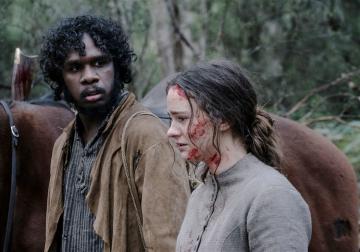"The Nightingale" is a brutal, hard to watch tale of revenge in the outback
The convict-colonization of Australia was in full swing by 1825, when we find Clare (Aisling Franciosi) singing a beautifully bittersweet song in a rowdy Tasmanian tavern.
A 21-year-old Irish woman with a good husband and baby, she has served out her seven-year sentence for thievery and is now desperate to be free of her domestic servitude and of the abusive military master, Lt. Hawkins (Sam Claflin), who refuses to release her.
Tasmanian devils of the human, not animal, kind are plentiful in this rough prisoners’ island off the coast of a rough continent with rough terrain and even rougher living conditions. If you’re there, by definition, you’re doing hardship duty in a place where everybody — including the British soldiers in charge — is rough on anybody beneath them.
“Let her go!” begs Clare’s husband (Michael Sheasby). “She’s paid her dues. She’s my wife!”
“She’s my property,” the lieutenant calmly replies.
- Starring: Aisling Franciosi, Baykali Ganambaar, Sam Claflin.
- Rating: R for extreme violence, multiple rapes, bloody murders and pervasive language.
Writer-director Jennifer Kent’s “Nightingale” is a shattering, hard-to-watch experience that features a terrible rape scene early on, followed by two even more terrible crimes, in which the colonial authorities have no judicial interest.
Lt. Hawkins leaves quickly to secure a promotion up north. Clare sets out to pursue him on her own, with the grudging help of aboriginal tracker Billy (Baykali Ganambarr), to thread the needle between natives and colonizers in the raging, ongoing “Black War.”
Ms. Kent’s previous (debut) film “The Babadook” (2014) was a psycho-horror thriller whose character study of a harried single mother was more concerned with her son’s behavioral issues than the supernatural forces that provoked them. Here, too, she puts character issues first: Clare’s and Billy’s mutual hostility and mistrust grow deeper as they go further into the wilderness, then shallower with empathy and the need for cooperation. While all (but one) of the white characters are disgusting, and get progressively worse, this Voyage of Revenge is full of ironic role-reversals — pursuers becoming pursued, and vice versa.
Irish-Italian Ms. Franciosi is quite terrific, as is Mr. Ganambaar, both possessed of the most powerfully expressive eyes. Mr. Claflin as the lieutenant (“Pirates of the Caribbean: On Stranger Tides” (2011), Hunger Games sequels “Catching Fire” (2013) and “Mockingjay” parts 1 & 2 (2014-2015) is a perfectly loathsome villain.
Special kudos to Becky, Clare’s long-suffering heroic horse on the journey.
FYI final factoids: The Black War (1825-1832) between Tasmania’s colonists and aboriginals was prompted by the rapid spread of British settlers throughout the natives’ kangaroo hunting grounds, and by the widespread kidnapping, rape and murder of aboriginal women by white convicts, settlers and soldiers. Of some 5,000 natives in 1803, about 1,200 remained by 1826, and only 300 were left at the end. The systematic annihilation of Tasmania’s indigenous population is now regarded as the only true genocide in English colonial history.
More important here: Think about — and please take — the following consumer warning very seriously: The three rape scenes within “The Nightingale’s” first half hour are followed by a half dozen more rapes and murders later, including a knife killing that takes a dozen lovingly close-up stabs to do the trick. If a man had directed this film, he would be roundly condemned for the prurient, gratuitous depiction of such savage brutality. But it’s OK if a woman director depicts it?
I don’t think so, and I condemn Ms. Kent for it, even as I say her choice to do so makes for a perversely riveting meditation on white-superior violence, not so far removed from 2019 as we might wish.
All hail the shocking boldness of contemporary Australian filmmaking. See it at your own emotional risk.
(Opens Friday at the Harris Theater, Downtown. In English, Irish Gaelic and Palawa Kani — the near-extinct Tasmanian language — with subtitles.)
Post-Gazette film critic emeritus Barry Paris: parispg48@aol.com.







